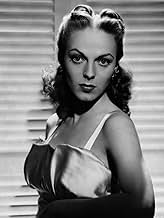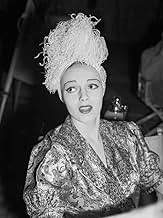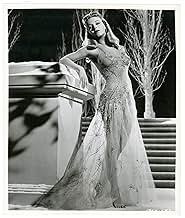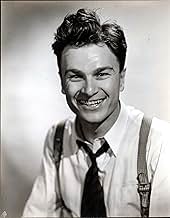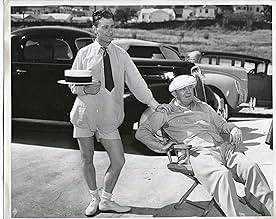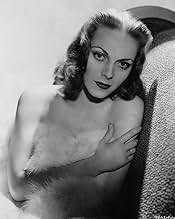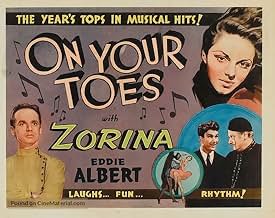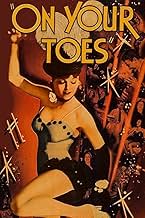A young hoofer quits vaudeville to become a composer and hooks up with a Russian ballet troupe.A young hoofer quits vaudeville to become a composer and hooks up with a Russian ballet troupe.A young hoofer quits vaudeville to become a composer and hooks up with a Russian ballet troupe.
- Awards
- 1 win total
Sarita Wooton
- Vera as a Girl
- (as Sarita Wooten)
Irving Bacon
- Second Stage Manager
- (uncredited)
Leon Belasco
- Mishka - Slave in Ballet
- (uncredited)
Symona Boniface
- Woman in Audience
- (uncredited)
Wade Boteler
- Second Policeman
- (uncredited)
Glen Cavender
- Extra as Stagehand
- (uncredited)
Lew Christensen
- Ballet Dancer
- (uncredited)
Featured reviews
There's really only reason why you'd find, rent, and sit through On Your Toes: if you love the dancing talents of ballerina Vera Zorina. She plays a ballerina and is given several scenes to shine. If you're just looking for a showbiz movie about the ups and downs of trying to have a stage career, look elsewhere.
The movie starts out in vaudeville, where James Gleason, Queenie Smith, and Donald O'Connor have a dancing act. Little Donald is absolutely adorable, but he's only in the movie for about fifteen minutes. Then he grows up, and gets replaced by Eddie Albert-fresh off Broadway and in his second-ever film-and the film turns into a bizarre Russian ballet. Eddie leaves vaudeville to pursue classical music, then he connects with Vera, Leonid Kinskey, Frank McHugh, and a strangely accented Alan Hale. The rest of the movie is very odd, full of ballet, and hardly any plot. I was hoping to see more of Eddie Albert singing and dancing, but he didn't get to show off his hidden talents. During the one scene he's shown tap dancing, the camera only shows his feet after a very obvious stunt double enters the frame from the opposite direction Eddie left.
The movie starts out in vaudeville, where James Gleason, Queenie Smith, and Donald O'Connor have a dancing act. Little Donald is absolutely adorable, but he's only in the movie for about fifteen minutes. Then he grows up, and gets replaced by Eddie Albert-fresh off Broadway and in his second-ever film-and the film turns into a bizarre Russian ballet. Eddie leaves vaudeville to pursue classical music, then he connects with Vera, Leonid Kinskey, Frank McHugh, and a strangely accented Alan Hale. The rest of the movie is very odd, full of ballet, and hardly any plot. I was hoping to see more of Eddie Albert singing and dancing, but he didn't get to show off his hidden talents. During the one scene he's shown tap dancing, the camera only shows his feet after a very obvious stunt double enters the frame from the opposite direction Eddie left.
I was disappointed in not hearing any of the great songs, such as "There's a Small Hotel," sung in this movie, apparently revised to accommodate its star Vera Zorina, who is a ballerina. Despite the onscreen credit for lyrics, the songs of Richard Rodgers and Lorenz Hart are used as background music throughout, while two pieces suitable to ballet were used to display Zorina's ballet skills. The first, "Princess Zenobia" started as a straight ballet, but with Eddie Albert substituting for a missing performer, it turns into a burlesque of ballet, and is a hit. I was uncomfortable with the implication that straight ballet cannot be enjoyed (which is even stated in the script). The second piece, "Slaughter on Tenth Avenue," was extremely well done and worth seeing. But here also, the writers injected other material. The impresario, Alan Hale, planned on having Albert killed at the end of the ballet. We know it and Albert learns of it while still on stage and sees the killers too, all of which creates a small amount of suspense. The overall plot is a little dumb, as in most early musicals, but I did enjoy seeing a young, dancing Donald O'Connor (playing Albert as a boy) and some of the gags supplied by Frank McHugh and Leonid Kinskey.
Absolutely terrible film version of the hit 1936 Broadway musical by Richard Rodgers, Lorenz Hart and George Abbott.
Ray Bolger originated the role of Junior, but here we have Eddie Albert as a last-minute replacement for James Cagney who bailed from the project after Warners specifically bought it for him. Albert was on the lot, having made a small splash the year before in BROTHER RAT. Since Albert couldn't dance, a double had to be used and the character's dancing was scaled back.
Also taking a hit, most of the songs are not performed and end up as background music. So "Small Hotel," It's Got to Be Love," "The Heart Is Quicker Than the Eye," and "Quiet Night" are basically eliminated from the film, leaving the character of Peggy Porterfield (Gloria Dickson) with nothing to do. The female character of Frankie Frayne is eliminated altogether. Even the title song only shows up as background.
The other giant hit this version takes is that both the "Princess Zenobia" ballet and the "Slaughter on 10th Avenue" number are scaled way back partly because Albert couldn't dance. This also takes the oomph out of Vera Zorina's starring performance. The music portions are cut back, but the hokey comedy and lengthy Vaudeville intro were retained.
Another huge minus is the terrible direction by Ray Enright, who apparently had never seen a good movie musical. There are endless cuts during the dance numbers and zoom-ins to close-ups and cutaways to peripheral characters. And it's painfully obvious that the close-ups of dancing feet are not of Eddie Albert.
Supporting cast tries hard, but most of the Russian humor falls flat. While Leonid Kinskey is fine as Ivan, Alan Hale is an odd choice for Sergei. We also get Frank McHugh as the stage manager, James Gleason and Queenie Smith as Albert's parents, Berton Churchill as the hotel manager, and Erik Rhodes bizarrely cast as the leading ballet dancer. Notable also is Donald O'Connor as the young Junior in the Vaudeville segments.
The musical has been revived twice on Broadway (I saw a production in London starring Doreen Wells in 1985), but this is the only film version, which is a real pity because the music is wondrous, and it would have been nice to see Zorina in a full-fledged version of "Slaughter on 10th Avenue."
Ray Bolger originated the role of Junior, but here we have Eddie Albert as a last-minute replacement for James Cagney who bailed from the project after Warners specifically bought it for him. Albert was on the lot, having made a small splash the year before in BROTHER RAT. Since Albert couldn't dance, a double had to be used and the character's dancing was scaled back.
Also taking a hit, most of the songs are not performed and end up as background music. So "Small Hotel," It's Got to Be Love," "The Heart Is Quicker Than the Eye," and "Quiet Night" are basically eliminated from the film, leaving the character of Peggy Porterfield (Gloria Dickson) with nothing to do. The female character of Frankie Frayne is eliminated altogether. Even the title song only shows up as background.
The other giant hit this version takes is that both the "Princess Zenobia" ballet and the "Slaughter on 10th Avenue" number are scaled way back partly because Albert couldn't dance. This also takes the oomph out of Vera Zorina's starring performance. The music portions are cut back, but the hokey comedy and lengthy Vaudeville intro were retained.
Another huge minus is the terrible direction by Ray Enright, who apparently had never seen a good movie musical. There are endless cuts during the dance numbers and zoom-ins to close-ups and cutaways to peripheral characters. And it's painfully obvious that the close-ups of dancing feet are not of Eddie Albert.
Supporting cast tries hard, but most of the Russian humor falls flat. While Leonid Kinskey is fine as Ivan, Alan Hale is an odd choice for Sergei. We also get Frank McHugh as the stage manager, James Gleason and Queenie Smith as Albert's parents, Berton Churchill as the hotel manager, and Erik Rhodes bizarrely cast as the leading ballet dancer. Notable also is Donald O'Connor as the young Junior in the Vaudeville segments.
The musical has been revived twice on Broadway (I saw a production in London starring Doreen Wells in 1985), but this is the only film version, which is a real pity because the music is wondrous, and it would have been nice to see Zorina in a full-fledged version of "Slaughter on 10th Avenue."
In 1920, The Dancing Dolans are headliners in vandeville. It is 15 years later and the family is still doing the same act to dwindling crowds. Phil Dolan Jr. (Eddie Albert) decides to leave. He falls for ballerina Vera Barnova (Vera Zorina). The two knew each other as kids in the vaudeville days. Russian Maestro Sergei Alexandrovitch (Alan Hale) is not having it.
This was adapted from a musical. While his acting is fine, I don't buy Eddie Albert as a song and dance man. I do buy him better as a comedic performer and songwriter. It's funny that he and Alan Hale's son would become TV royalty. There is a sitcom TV quality to this. I can't speak to the stage musical. I doubt the quality of this is matching up to that. In this, I have no sacred cow in the debate. I don't hate it. It is borderline pass for me.
This was adapted from a musical. While his acting is fine, I don't buy Eddie Albert as a song and dance man. I do buy him better as a comedic performer and songwriter. It's funny that he and Alan Hale's son would become TV royalty. There is a sitcom TV quality to this. I can't speak to the stage musical. I doubt the quality of this is matching up to that. In this, I have no sacred cow in the debate. I don't hate it. It is borderline pass for me.
The main reason to see this movie is the performance of Richard Rogers's mini-ballet, "Slaughter on 10th Avenue." The melody will haunt you for days, and George Ballanchine choreographed the piece for the film's star, Norwegian ballerina Vera Zorina. Her costar Eddie Albert (remember Green Acres?) was supplied with a dancing double. --Musicals on the Silver Screen, American Library Association, 2013
Did you know
- TriviaIs adapted from a Broadway musical that opened at the Imperial Theater in New York on April 11, 1936 and ran for 315 performances. Ray Bolger starred in the original stage production. The musical was revived on Broadway in 1954 and 1983.
- GoofsGeorge Balanchine's name is misspelled as "Ballanchine" in the credits.
- Quotes
Sergei Alexandrovitch: I will not give the American audiences what they want, I will give them what they ought to like.
- Crazy creditsLorenz Hart, the lyricist for the original Broadway show, receives onscreen credit, but his lyrics are never sung at all in the film.
- ConnectionsFeatured in That's Dancing! (1985)
- SoundtracksOh, You Beautiful Doll
(uncredited)
Music by Nat Ayer
Danced by Donald O'Connor, Queenie Smith and James Gleason
[Second number performed by the Dancing Dolans, repeated during the vaudeville bits]
Details
- Runtime
- 1h 34m(94 min)
- Color
- Sound mix
- Aspect ratio
- 1.37 : 1
Contribute to this page
Suggest an edit or add missing content

